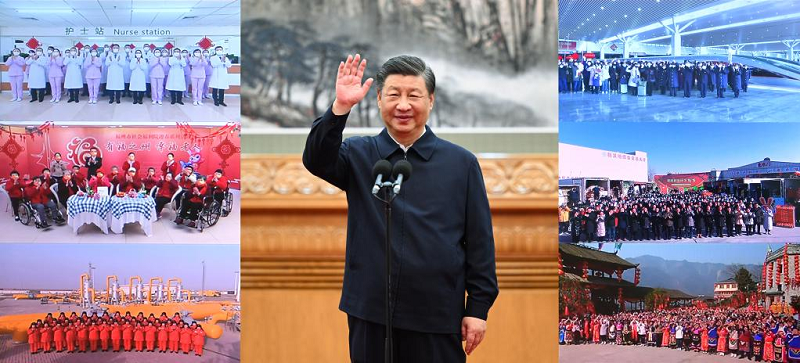Profile: With popular mandate, Xi Jinping spearheads new drive to modernize China

This combo photo shows Xi Jinping extending festive greetings to all Chinese people when he speaks with cadres and people from across the country via video calls ahead of the Spring Festival in Beijing, capital of China, Jan 18, 2023. [Photo/Xinhua]
Before the Spring Festival, Xi spoke with cadres and people from across the country via video calls. He asked a cadre from a Qiang ethnic minority village in Sichuan province about the number of tourists and their income. After Xi learned that the per capita income of the whole village exceeded 40,000 yuan last year, he exclaimed "Not bad!"
Wei Zhuo, a tourist, told Xi about her experience in the village. In particular, she said, the local Sichuan-style cured pork was delicious. "The general secretary asked me to eat more," Wei said. "I feel that he cares a lot about rural development and boosting the income of the common people. "
Xi told the accompanying cadres that "the most arduous and demanding task of building a modern socialist country still lies in the countryside. " At the Central Rural Work Conference in late 2022, he said to strengthen the country, agriculture must be strong first, emphasizing that ensuring a stable and safe supply of grain and important agricultural products is always the top priority.
Seeking truth from facts is a tenet much cherished by Chinese Communists. Xi himself has set a good example. Over the past decade, he has made over 100 inspection trips to the grassroots level to obtain firsthand experience on the ground.
One time, he left Beijing early in the morning and arrived in a mountainous region in Southwest China's Chongqing in the evening. Sitting in the courtyard with the locals, he said, "I took a plane, a train, and a car, switching between three modes of transportation just to get here to meet you and hear what you have to say to us. "
Another time, at a group discussion of the "two sessions," Xi said, "You officials cannot fool me. I come from a poverty-stricken area, and I know what it's like. "
The "new development philosophy," introduced by Xi in 2015, prioritizes innovation, coordination, green development, openness, and sharing. It is expected to guide China's modernization drive.
Sci-tech innovation is a priority. Xi has urged the acceleration of the pace of self-reliance and self-strengthening in this regard.
Zhang Jin, an NPC deputy and president of robotic company Xinsong, recalled Xi's visit to the company a few months ago.
"In the workshop, he almost stopped at every step and asked questions all the way, showing a strong interest, especially in the company's self-developed products such as mobile robots used in automobile assembly production lines and robotic arms in the chip-manufacturing industry," Zhang said.
During a conversation with young engineers, Xi stressed that independent innovation is crucial for a country's transition to a manufacturing powerhouse. He raised the question of whether there are still lots of technical challenges that need to be addressed urgently and stated that it is imperative to promote scientific and technological self-strengthening to resolve "bottleneck issues," some of which are caused by Western technological blockade.
Xi repeatedly emphasized that reform must adhere to the direction of the socialist market economy. In January, he sent a vice premier to the Davos World Economic Forum annual meeting where the official announced that China will never go back to pursuing a planned economy.
In February, a major reform involving the entire capital market was introduced, promoting a registration-based system for the entire market and various public issuance of stocks, which is beneficial for better allocation of resources according to market mechanisms.
At the same time, Xi deployed measures to prevent systemic risks in finance, real estate, and local government debt.
He emphasized on different occasions that, on one hand, China must deepen the reform of State-owned assets and enterprises, and on the other hand, it should continue to improve the business environment for the private sector.
At this year's "two sessions," Xi told private entrepreneurs that the Party "has always regarded private enterprises and private entrepreneurs as its own people" and encouraged them to let go of their concerns and burdens, and boldly pursue their development.
"I have always supported private enterprises," said Xi, who has worked for more than 20 years in the provinces of Fujian and Zhejiang, both known for the vibrant private sector.
Chinese private enterprises have continued to grow. According to the Peterson Institute for International Economics, in 2012, nonpublic enterprises accounted for only about 10 percent of the total market value of China's top 100 listed companies. However, by the end of 2022, this proportion had risen to over 40 percent.
Xi said he plans to roll out a new round of overall reform measures this year. High-level opening-up will also be accelerated, including actively promoting the accession to high-standard economic and trade agreements such as the Comprehensive and Progressive Agreement for Trans-Pacific Partnership (CPTPP) and the Digital Economic Partnership Agreement.
In 2021, China's overall tariff level was reduced to 7.4 percent, lower than the WTO commitment of 9.8 percent. The country plans to further drop tariff rates for 62 information technology products, and the overall tariff level will be lowered by another 0.1 percentage point.



